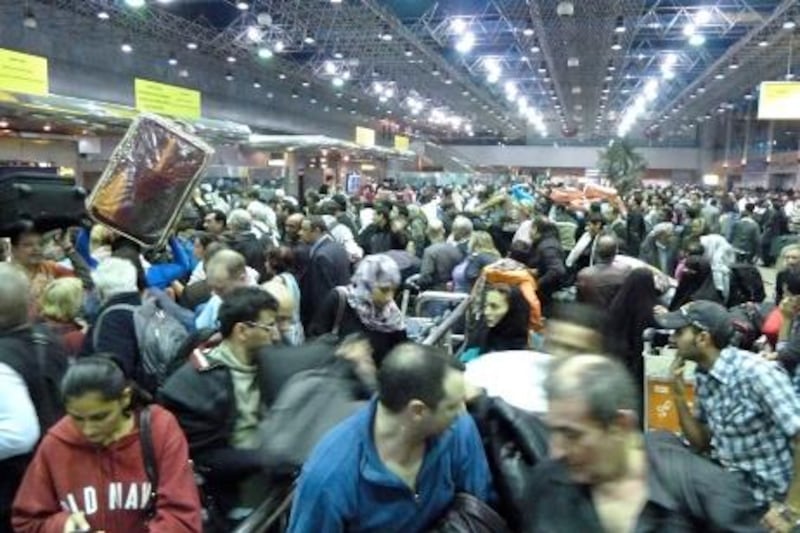The economic implications of the continuing unrest in Egypt were put in sharp focus yesterday as top banking executives expressed concern about capital flight out of the country and Brent crude oil hit $100 a barrel.
Brent, the European benchmark, touched $100.05 a barrel in after-hours trading on London's ICE exchange, its highest level since September 2008.
With protests continuing for a seventh day and demonstrators warning of escalating trouble, bank chiefs braced for further repercussions from the political tension and international companies began evacuating employees.
"I believe that any kind of rioting or instability will definitely hamper and have a negative impact on the economy," said Yasser el Mallawany, the chief executive of EFG-Hermes.
Mr el Mallawany, the head of Egypt's largest investment bank, said his greatest concern was a large number of foreign investors pulling their money from the country.
"There will be flight of capital definitely driven by hot money," he said. "How much is left to be seen."
____________________________________
Follow our Business tweets - twitter.com/biznationaluae
____________________________________
Hisham Ezz al Arab, the chairman and managing director of Egypt's largest private financial institution Commercial International Bank (CIB), said last night the biggest threat to the economy would be if banks remained shut for another two weeks.
While CIB could last at least 30 days without opening, Mr al Arab said it could have stark impacts on the rest of the system.
"Honestly, I think this won't happen and that banks will open again on Sunday," he said. "But that is the biggest risk … Egypt is very important for the rest of the world.
"If Egypt goes into chaos, the entire Middle East will go into chaos and problems will spread to Europe. Then we will have bigger things to worry about than the stock markets being closed."
Four of CIB's 160 branches have been damaged during looting and protests. Mr al Arab said he was spending his afternoons and evenings on the streets of the upscale island of Zamalek in Cairo to help maintain security, along with a cohort of youths who had organised a temporary militia.
Meanwhile, traders have become increasingly concerned about oil supply constraints on shipping through the Suez Canal if the turmoil persists.
About 1 million barrels of Gulf crude pass through the canal daily en route to Europe and North America.
Canal officials said yesterday traffic was "normal" and AP Moller-Maersk, the world's biggest container-shipping company, said it was not diverting vessels away from the passage.
But the Port of Suez has been without customs or immigration officials for several days and the Port of Alexandria was closed yesterday as a result of a large protest, in developments that threaten to starve the country of imported goods.
In response to the upheaval, a number of regional and global companies with operations in Egypt closed offices out of concern for employees' safety.
DP World, the ports operator owned by Dubai World, said yesterday it had temporarily suspended operations at the Sokhna port in Egypt as a "precautionary measure" and that it was "closely monitoring the situation in Egypt".
The commercial property consultancy CB Richard Ellis is in talks with 20 companies about possibly moving their back-office operations from Egypt to the UAE, said Nicholas Maclean, the company's managing director for the Middle East.
"There is no panic or rush, we're just developing contingency plans," Mr Maclean said. "If they are looking to relocate people, the UAE is the logical choice."
The ratings agency Moody's Investors Service yesterday downgraded Egypt's government bonds from "stable" to "negative", saying the country was facing "deep-seated political and socio-economic challenges" including high unemployment, increased inflation and widespread poverty.
As the Cairo Stock Exchange remained closed, outside investors continued to speculate on whether other countries in the region would be seriously affected by the situation.
Last Friday and in early trading in the region yesterday, the prevailing sentiment was that Egypt's troubles presented increased risk. The spreads on credit default swaps rose sharply - even for wealthy bond issuers such as Qatar and Abu Dhabi.
The price for Abu Dhabi 5-year credit default swaps approached 120 basis points yesterday but settled back late in the day to about 105 basis points, only slightly higher from where they closed Friday.
"The market is very volatile," said one fixed-income trader in Dubai, who wished to remain anonymous. "But we're starting to see people who think maybe it does not make sense to lump the whole region together."
The Abu Dhabi Securities Exchange General Index rebounded from Sunday's steep losses with a gain of 1 per cent, while the Dubai Financial Market was also more stable, losing 0.5 per cent.
But on the ground in Cairo, the situation grows more stark. Cash machines throughout Egypt could run out within three to four days, said the chief executive of an Egyptian bank, who declined to be named.
"We need to open the banks soon so people can get their basic needs," he said. "But it's very risky transporting cash on the streets. The central bank was clear in their message to banks - they said they will not open the banks until the security is up to the acceptable level."
Some in Egypt are already having difficulty finding cash, while others reported problems finding food.
Mohamed Homdy, an Egyptian living in Abu Dhabi, said family members in Cairo had considered leaving but were intimidated by the chaos at the airport.
"The main issue is buying food - people are hoarding," Mr Homdy said, adding that shopkeepers were charging three to four times the normal price for bottles of water.
bhope@thenational.ae
* with additional reporting by Rory Jones, Kevin Brass and Ivan Gale





